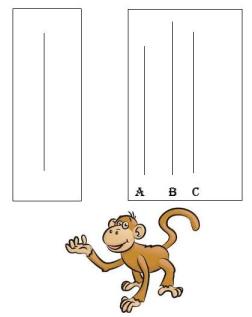Just completed a class on the Asche effects. Interestingly enough, this effect is not new. We have known it since our very early days. We just have not studied it scientifically enough..
One of the stories in the Panchatantra has strong parallels but draws these effects to another extreme. Here is the story:
Once, there lived a pious priest, Mitra Sharma in a small village who used to perform religious rituals. On one occasion, he was rewarded with a goat for his ritual services. The happy man slung the goat over his shoulder and began the journey towards his home. On the way, three Thugs saw the priest taking the goat. They said, “This goat will make a delicious meal for all of us. Let’s somehow get it”. All of them devised an ingenious plan to cheat Mitra Sharma so that they could cheat him and take away the goat. After deciding the plan, they got separated from one another and took different hiding positions at three different places on the way.
As soon as the man arrived at a lonely place, one of the cheats came out of his hiding place and asked Brahmin in a shocking manner, “Sir, what are you doing? I don’t understand why a pious man like you needs to carry a dog on his shoulders?” The Brahmin was surprised to hear such words. He screamed, “Can’t you see? It’s not a dog but a goat, you stupid fool”. The cheat replied, “Sir, I beg your pardon. I told you what I saw. I am sorry, if you don’t believe it.” Sharma was annoyed at the discrepancy, but started his journey once again.
Barely after a little distance, when another cheat came out of his hiding place and asked the Brahmin, “Sir, why do you carry a dead calf on your shoulders? You seem to be a wise person. Such an act is pure stupidity on your part. The Brahmin yelled, “What? How can you mistake a living goat for a dead calf?” The second cheat replied, “Sir, you seem to be highly mistaken in this regard. Either you don’t know how does goat look like or you are doing it knowingly. I just told you what I saw. Thank you”. The second cheat went away smiling. The priest got confused, but continued to walk further. Again the Brahmin had covered a little distance when the third cheat met him. The third cheat asked laughingly, “Sir, why do you carry a donkey on your shoulders? It makes you a laughing-stock”. Hearing the words of the third thug, the Brahmin became really worried. He started thinking, “Is it really not a goat? Is it some kind of a ghost?”
He thought that the animal he was carrying on his shoulders might really be some sort of ghost, because it transformed itself from goat into a dog, from dog into a dead calf and from dead calf into a donkey. The Brahmin got frightened to such an extent that he hurled the goat on the roadside and ran away. The three tricksters laughed at the gullible Brahmin. They caught the goat and were happy to feast on it.
Moral: If you are sure about what you are carrying, do not believe the thugs!
As I was sitting thru the class and listening to the Asche effect, I was slightly disturbed as to why this social phenomenon should be given a new name. Indian Chauvanism eh??
Should this story itself not have been a case for IIMA?
Another corollary of this story is found here: An interesting OB lesson this?
Did not we see this so frequently @ work ..so many things unquestioned
something not documented.. that is how it has been!
Suggest a new approach and got the question why change now?
This emulation of what appears to be an equilibrium (read inertia) isn’t it one of the primary factors contributing to the lack of innovation?
Blessed is the monkey that can question status quo and break the ice..
But one question to Jason wells… Why did not all the monkeys shoot forward at the very first instance? What was done to prevent them?
See the associated comments as well.. they too are quite resonant..
(OB stands for Organizational Behaviour)



Very well said Rahul. It sometimes feel so true
could not agree more rahul. another well known fairy tale where the effect has been similarly captured is ‘the emperor has no clothes’ by hans anderson. i guess the effect has been recongnised intuitively for long but it took somebody to study it and put it down as an organisational behaviour.